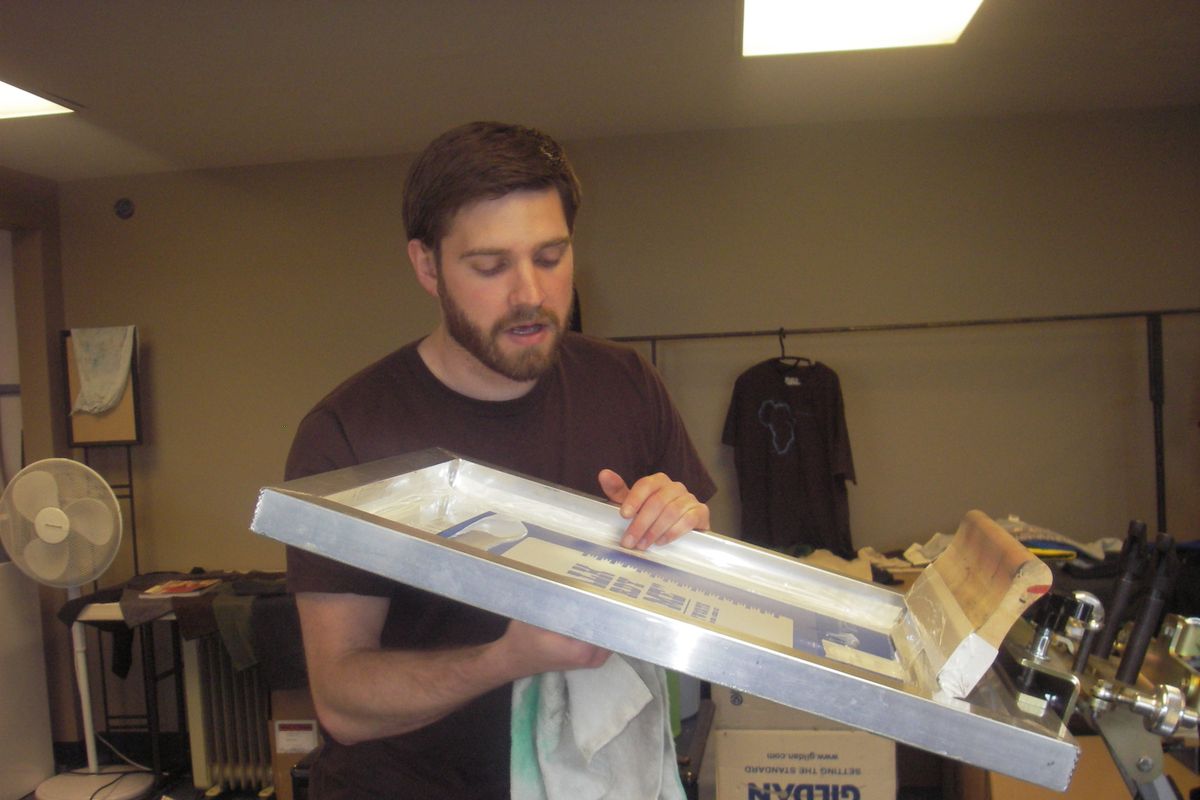Blue Button connecting students, shirts
Soft, safe and sweatshop-free

After experiencing the feel of organic cotton, it’s hard to go back – especially when you know it’s better for the environment.
At Blue Button Apparel – a non-profit custom screen-printing shop in north Spokane – the T-shirts aren’t just comfortable; they’re also part of an effort to make a difference in the world.
What you wear, after all, is far more than a fashion statement. The harvesting of cotton and manufacturing of clothes can have a lasting impact on the Earth as well as diverse communities throughout the globe. That’s why Blue Button produces apparel for organizations that “care about the planet and the people who live on it,” said Scott Ellis, who founded the company last fall.
“We vote with our dollars,” Ellis wrote on Blue Button’s website (www.bluebutton.org). “It’s time we start voting for a different way of doing business – one that values people and planet; one that holds corporations responsible for their actions; one that brings hope locally and globally.”
Blue Button also works with at-risk students by providing jobs, meals after shifts, rides to and from work, and much needed mentorship.
Ellis came up with the idea for a “non-profit social enterprise” last year after he and others at Crosswalk Community Church in Hillyard learned about the growing number of homeless youth in the neighborhood.
In December 2008, a counselor at Rogers High School talked to church members about her students and how some struggle with poverty, abuse and neglect on a daily basis. They learned about kids whose parents manufacture and abuse meth at home; youth who have spent years in various foster care situations; teens who have left abusive households and have no choice but to fend for themselves.
The congregation rallied to buy Christmas gifts for the students at Rogers. When he delivered the presents to the school, Ellis met some of the teens and was profoundly touched by their plight.
“We started asking ourselves, ‘How can we help out?’” he said. “What can we do that’s more empowering besides just giving stuff to the school?”
Ellis wrestled with this question for many months.
At the same time, the 27-year-old was trying to open a coffee shop in Hillyard. Just as he was about to give up after encountering too many “brick walls,” he realized he needed to focus on something that could also help the neighborhood teens. That’s when he came up with the idea of printing T-shirts — a skill he acquired after watching YouTube videos and reading various tutorials.
A Whitworth University graduate who majored in business management, Ellis talked to Crosswalk’s pastor, the Rev. Mike Brose, about leasing work space at the church.
He got a loan and purchased screening and printing equipment. Last summer, Blue Button was in business.
Ellis has hired two teens who live in Hillyard – one a student at Lewis and Clark High School and the other from Rogers. The teens each work about 12 hours a week and are paid minimum wage. Ellis picks them up after school and drives them to the church, where they work until about 7 p.m. a few times each week. During their shifts, they mix ink, apply it to the screens, print the design on T-shirts and then dry them using special equipment. On an average day, the students and Ellis print about 50 shirts an hour. After their shift, Ellis provides them dinner and then drives them home.
Jessica Hettich, who’s 16 and a sophomore at LC, had never been paid to work before this job.
“Normally, I hang out with friends,” she said, describing her afterschool routine. “But now, I work a few afternoons a week. I like it. It’s laid back here. … I’ve learned a lot and become more disciplined.”
Ellis hopes to provide incremental raises every six months or so. Depending on the amount of shirt orders Blue Button receives this year, his goal is to employ an additional six to eight students by the end of 2009. He also has started a mentoring program that pairs at-risk youth at Rogers with college students attending Whitworth.
A longtime Spokane resident, Ellis said Blue Button combines his passion for the environment with his desire to mentor and help young people. After graduating from Whitworth in 2004, Ellis worked at various summer camps, where he worked with youth. He also landed a job with REI, where he learned about organic fabrics and eco-friendly apparel and equipment.
Blue Button uses shirts made only of organic cotton or bamboo, which provide moisture absorption and breathability. Shirts from the company’s main supplier are Fair Trade- certified by the Fair Wear Foundation in Europe and manufactured using wind and solar energy. Ellis also uses eco-friendly and water-based inks for printing. The ink soaks into the shirt and doesn’t crack unlike silk-screened shirts printed with petroleum-based ink.
According to Ellis, every T-shirt purchased through Blue Button prevents a half pound of chemical fertilizers and pesticides from entering the soil. And because the shirts are Fair Trade-certified, buyers know that the people who made the apparel are guaranteed a living wage and ensured safe working conditions — unlike clothing from most Third World factories, where the poor are often exploited and underpaid.
Although Blue Button’s shirts cost about $3 more than other silk-screen printers, dozens of organizations throughout the region have placed orders. These groups – whose orders range from about 10 T-shirts to as many as several hundred – not only want comfortable, long-lasting shirts, they say; they also share Blue Button’s environmental ethic and concern for workers throughout the world.
In the past year, some of the organizations that have ordered Blue Button shirts include: Havermale High School, 49 Degrees North, Pedals to People, AWANA Clubs International and various clubs and residence halls at Whitworth University.